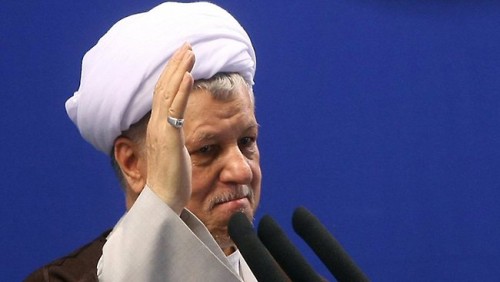LATEST: Tehran Fires Another Volley at Saudi Arabia Over “Foreign Plot” of Falling Oil Prices
Amid their growing worries about Iran’s economy, hardliners in the regime are continuing to declare their concern with “sedition” — and they are including former President Hashemi Rafsanjani in the threat.
Delivering the Tehran Friday Prayer, Ayatollah Ahmad Khatami said:
It is important for various political groups to have reconciliation; however, this does not mean reconciliation with the heads of sedition. This is because USA, Britain and Zionists supported them….
Our officials need to be careful and remember that it is the remarks and opinions of the Supreme Leader which are to be followed in regards to the seditionists.
The regime has used the term “sedition” to cover those in the mass protests against the disputed 2009 Presidential election. “Seditionists” include political leaders such as Mir Hossein Mousavi and Mehdi Karroubi — both candidates in the 2009 election — who have been held under strict house arrest since February 2011; hundreds of detainees; students and professors who have been expelled and fired; human rights lawyers; labor activists; and other dissidents.
And for some hardliners, it also includes former President Hashemi Rafsanjani, who continues to head the Expediency Council and who may soon stand for leadership of the Assembly of Experts.
Seyyed Mohammad Khamenei, the older brother of the Supreme Leader, accused the former President of being an American agent: “The USA was trying to designate Hashemi Rafsanjani as the Supreme Leader after Ayatollah Khomeini’s demise [in 1989].”
Khamenei declared that Rafsanjani had collaborated with the US during the Iran-Contra affair, with the Americans scheming for him to take over after they assassinated Khomeini.
Hojatoleslam Ali Saeedi, the Supreme Leader’s representative in the Revolutionary Guards, supported the attack on Rafsanjani, without naming him: “I am surprised that some individuals are trying to enforce their personal opinions on the Supreme Leader in regards to the fate of the heads of sedition.”
Rafsanjani, who was President from 1989 to 1997, has appealed unsuccessfully on several occasions to the Supreme Leader for the release of political prisoners.
The former President provoked the ire of hardliners when, as Tehran Friday Prayer leader, he said in July 2009 that protests were legitimate and should not be suppressed by the regime. He was immediately removed as a prayer leader and put under political and legal pressure, with two of his three children subsequently arrested.
In Friday’s Tehran Prayer, Ayatollah Khatami complemented the attack on “seditionists” with further evidence of regime in-fighting, as he challenged the Rouhani Government: “Corruption will not be eradicated by just holding conferences.”
In his speech to the conference — also addressed by the Supreme Leader — President Rouhani issued a wide-ranging condemnation of corruption within the State as well as society. The speech was seen by observers as a warning to the Revolutionary Guards, accused of using their power to claim Iranian economic interests.
Tehran Fires Another Volley at Saudi Arabia Over “Foreign Plot” of Falling Oil Prices
Iran has renewed its criticism of Saudi Arabia over the falling global oil price, which is adding to Tehran’s economic worries.
Deputy Foreign Minister Hossein Amir Abdollahian told reporters on Friday, “Riyadh’s lack of effort in preventing the price drop is at odds with the atmosphere of the diplomatic negotiations between Iran and Saudi Arabia.”
Claims have circulated that Amir Abdollahian failed, in secret meetings with the Saudis last week in Oman, to persuade them to prop up an oil price which has fallen from nearly $120/barrel in June to about $65/barrel now.
On Wednesday, President Rouhani said the falling price was a “foreign plot” against Iran, the region, and the Islamic world.
See Iran Analysis: Did Tehran Fail in Secret Meeting with Saudis Over Oil Price?
Iran Daily, Dec 11: Is Rouhani Panicking Over the Economy?

